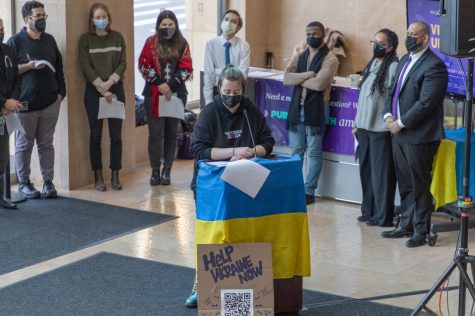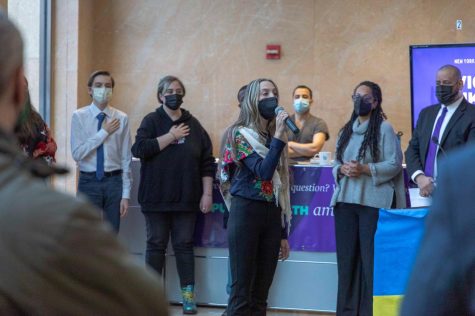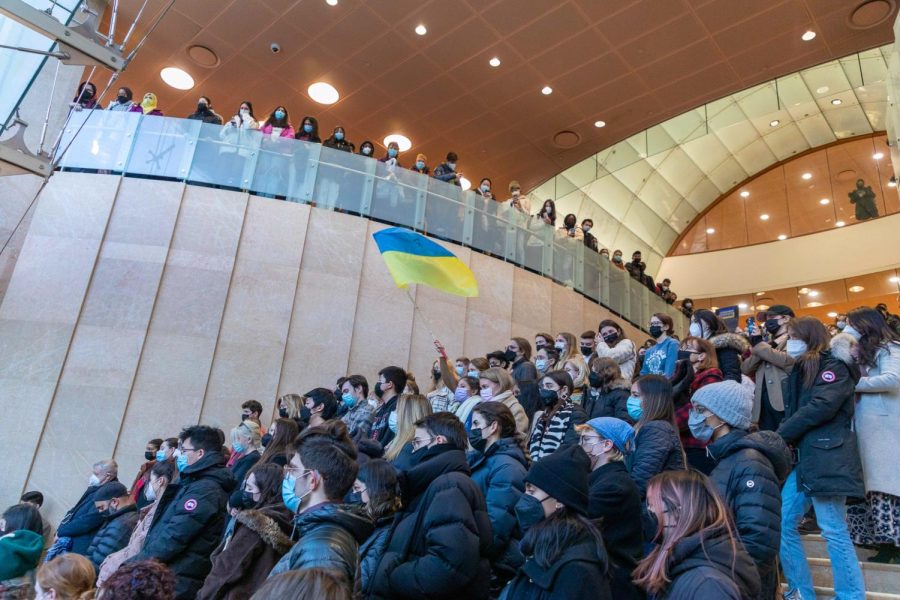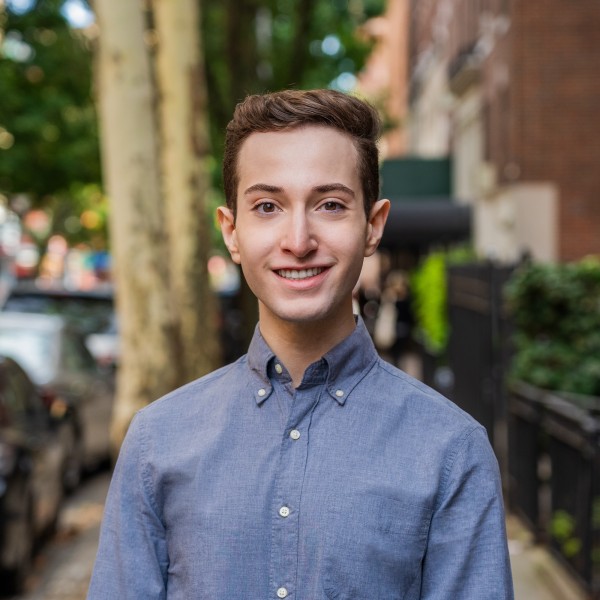Hundreds gather at NYU vigil for Ukraine
Members of the university community crowded the steps of the Kimmel Center for University Life to show support for Ukraine at a vigil on Monday, Feb. 28.
More than 400 members of the NYU community convened at the steps of the Kimmel Center for University Life to participate in a vigil for Ukraine. (Photo by Joshua Becker)
March 1, 2022
More than 400 members of the NYU community lined the steps of the Kimmel Center for University Life to attend a vigil for Ukraine on Monday, Feb. 28. Students leaned over railings and peered in through the windows to hear student and faculty speakers discussing the Russian invasion and how it has impacted their lives.
The vigil — organized by NYU’s administration, student government and offices of Student Affairs, Global Spiritual Life, and Global Inclusion, Diversity, and Strategic Innovation — came after Russia invaded Ukraine on Feb. 24.
“It’s disheartening, it’s unjust and it’s senseless,” Ron Hall, CAS junior and Presidents Council vice-chair of NYU’s student government, said regarding the invasion. “It’s all about centering the voices of Ukrainian students and Russian students during this time and seeing what they need and doing what we can to supply that.”
CAS senior Finley Muratova, the first student speaker of the event, told the crowd about their 85-year-old Ukrainian great aunt, Nina, who grew up during the Nazi occupation and recently recovered from COVID-19. Muratova said it has been difficult to contact her as the conflict with Russia intensifies. (Muratova is a former member of WSN’s editorial staff.)

“Nina, who survived the Nazi occupation, might not survive Putin’s,” Muratova said. “Ukraine has already lost almost 400 of its civilians to Putin’s unprovoked, unwanted war. And tomorrow, Nina might become part of this statistic — this statistic that includes someone’s parents, someone’s sibling, someone’s children, the love of somebody’s life.”
Muratova called on the crowd to continue to speak up against the war, donate resources and provide help in any way. They specifically called on Russian citizens to continue opposing the war, since its casualties also include Russian citizens and soldiers.
GSAS alum and Ukrainian citizen Maryna Prykhodko urged the crowd to stand in solidarity with her home country. She described the situation of her friend, a former NYU student who is living in a bomb shelter near a nuclear power plant in Ukraine and has limited access to water, electricity and internet. Prykhodko said that her friend has been taking iodine pills to protect herself from potential radiation exposure.
“Nice words and words of support aren’t enough right now,” Prykhodko said. “You need to turn to your government and tell them to support Ukraine now financially, militarily. Enact strong sanctions against Russia and enact a no-fly zone over Ukraine because it’s the only way to save millions of Ukrainian lives now.”
Wagner graduate student Marcin Branowski, who is Polish and chair of the executive board of right-wing libertarian organization Students for Liberty North America, said the war is representative of Putin’s fear-mongering belief that people from different backgrounds are not able to coexist with one another.
“Putin and others like him are trying to force us to believe that we cannot solve our differences, that we cannot live next to others who look or speak differently, with whom we share different histories,” Branowski said. “But this city and this university stands as a testament to how misguided this idea is.”
Melissa Carter, the interim senior director for Global Spiritual Life, offered resources and support to student and faculty attendees. She referred students struggling in any way to the Wellness Exchange, Spiritual Life advisors and any staff attending the vigil.
“Right now the energy of dominance, greed and hate threatens to unsettle our shared humanity,” Carter said. “But I believe the energy of hope and of love are stronger. You’re also bearing witness to solidarity protests around the world, to acts of charity, of unity and self-sacrifice.”

Protests were held throughout New York City last week calling for the end of the invasion and the support of Ukrainian citizens. Students and faculty joined in a demonstration at Washington Square Park, where the NYU Russian Club hosted a fundraiser for, and information booth about, Ukraine.
The Student Government Assembly and NYU Abu Dhabi’s student government released statements opposing the Russian invasion. President Andrew Hamilton addressed the invasion of Ukraine during a University Senate meeting on Feb. 24, and later released a statement on Feb. 28 providing resources to support those from the university community who are impacted.
“Remember that those from Ukrainian backgrounds are under particular strain,” Hamilton wrote to the community. “We have reached out to them to provide a variety of resources and support. We should make a special effort to be generous, and patient with one another at this time. And we should all be mindful that this dispute is with the government of Russia, not Russian students, faculty or staff at NYU.”
The vigil concluded with a moment of silence for those who have lost their lives or had to flee Ukraine as a result of the conflict. Branowski said he has continued to check on his loved ones in Europe while closely watching the news and protesting.
“Let’s show the world that democracy is not only alive, but will only grow stronger because of this,” Branowski said. “So keep marching on the streets, keep rallying those around you, keep tweeting, keep donating, keep fighting.”
Contact Isabella Tapia at [email protected].

























































































































































